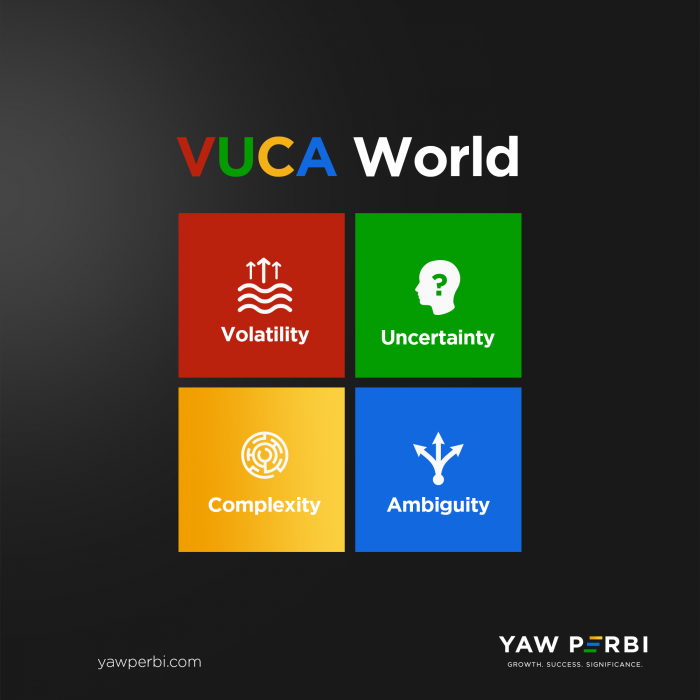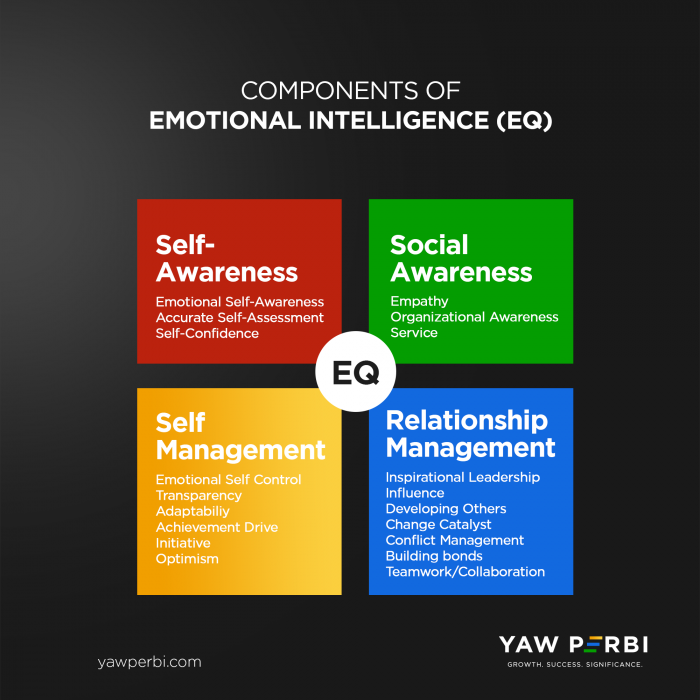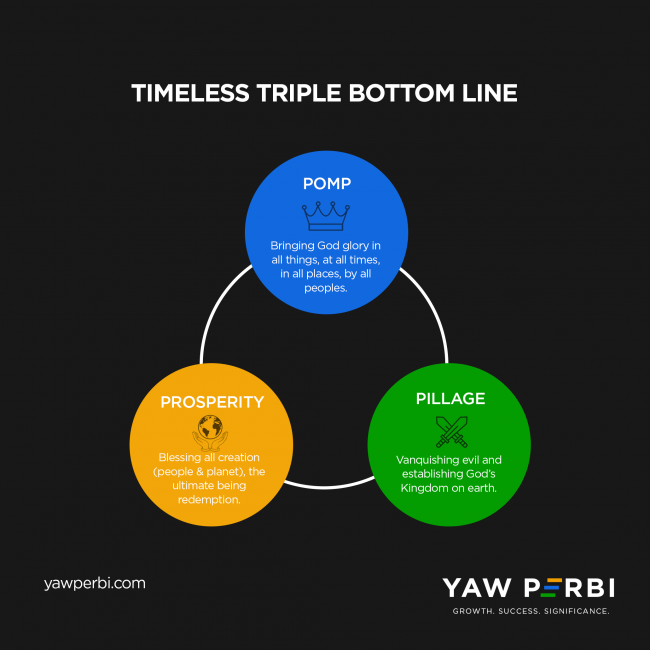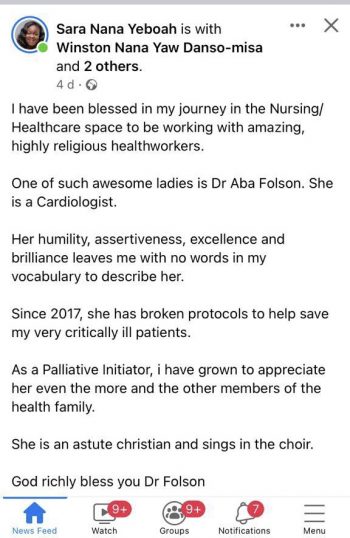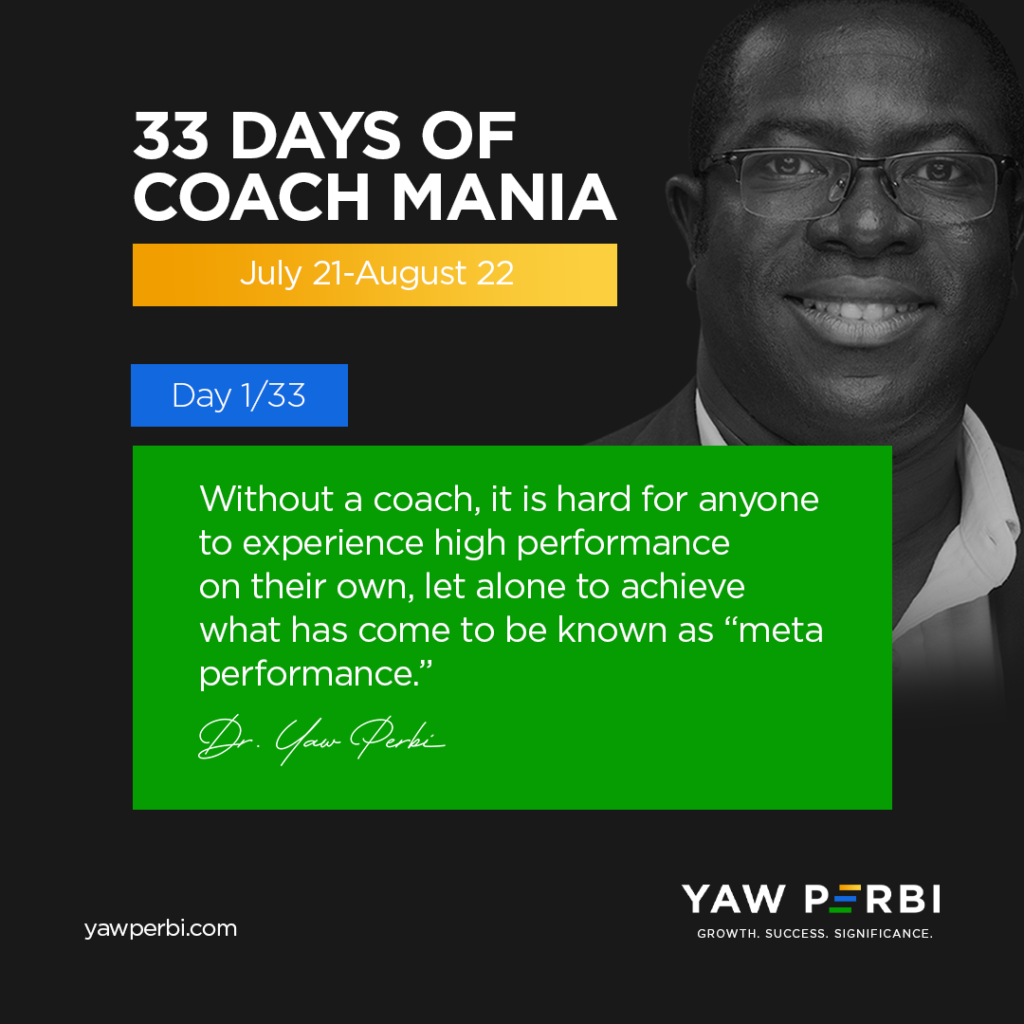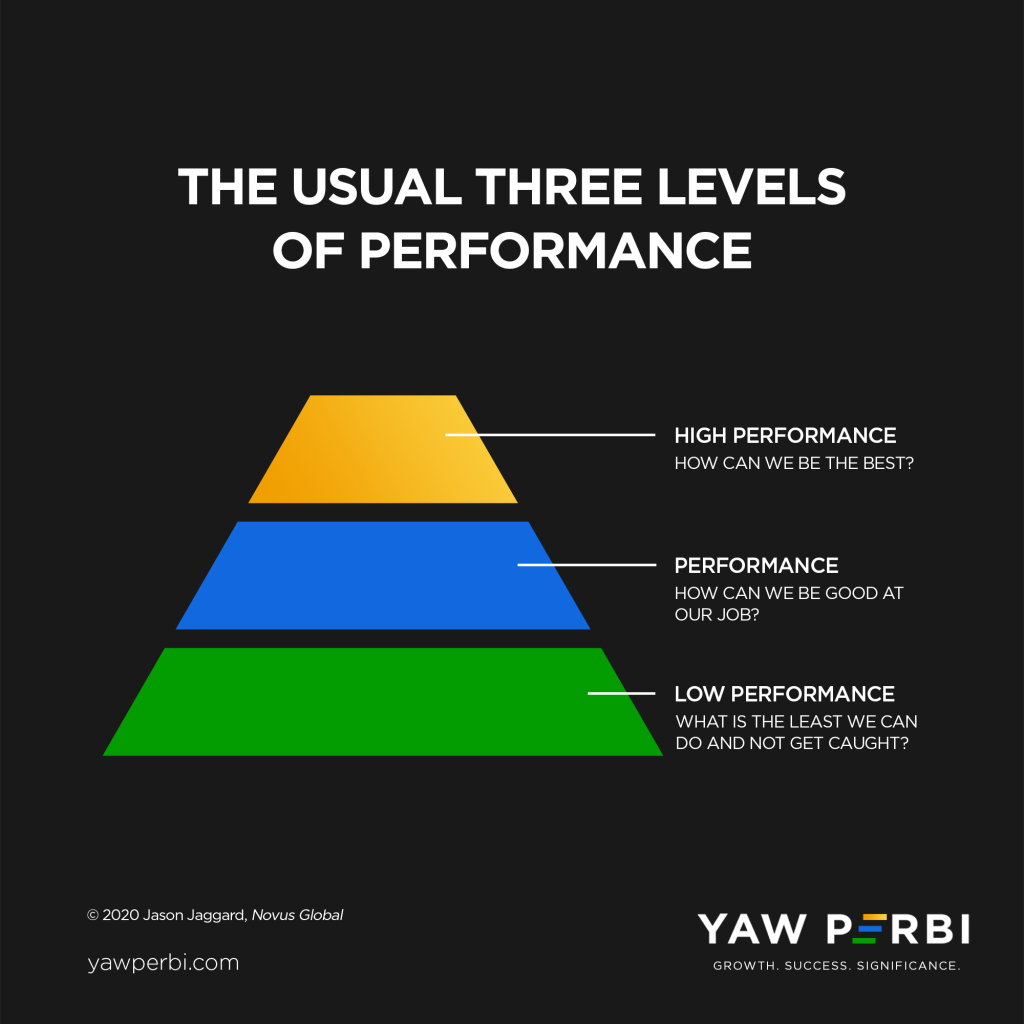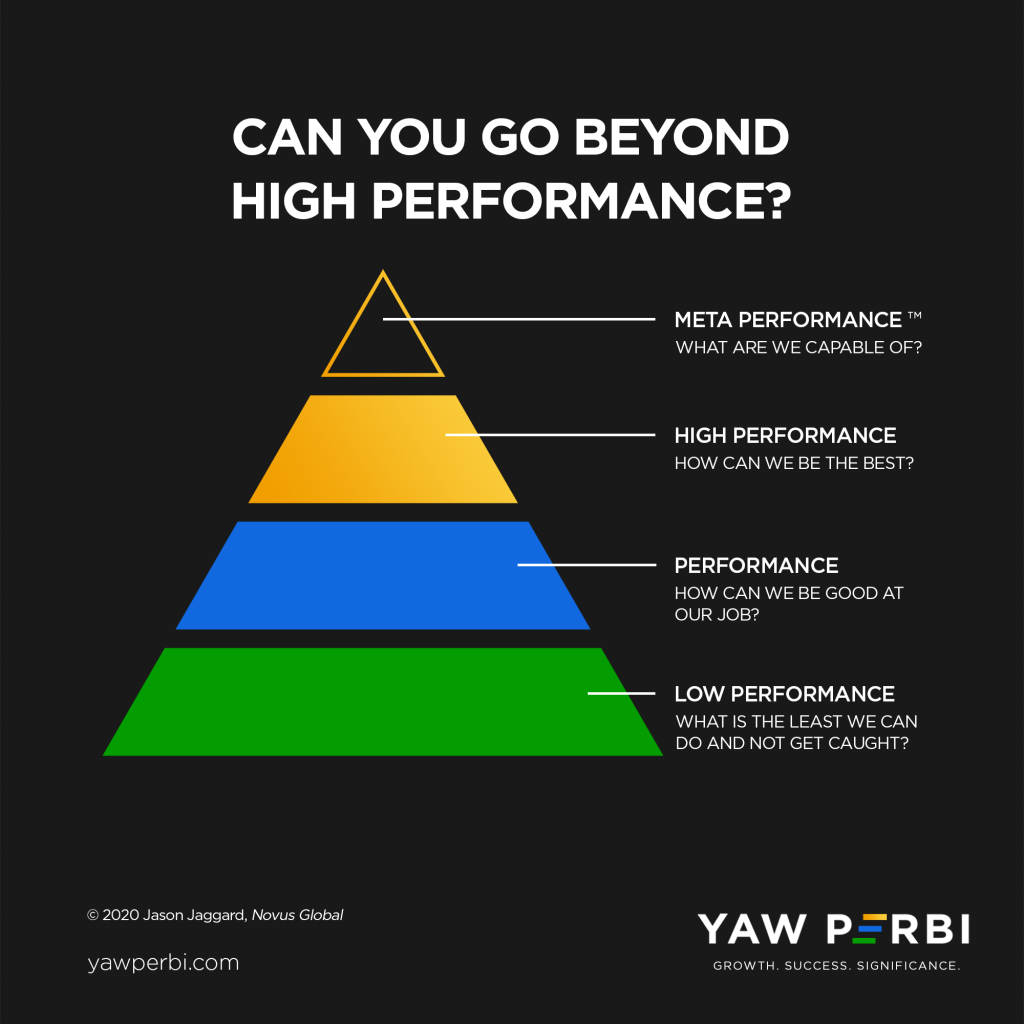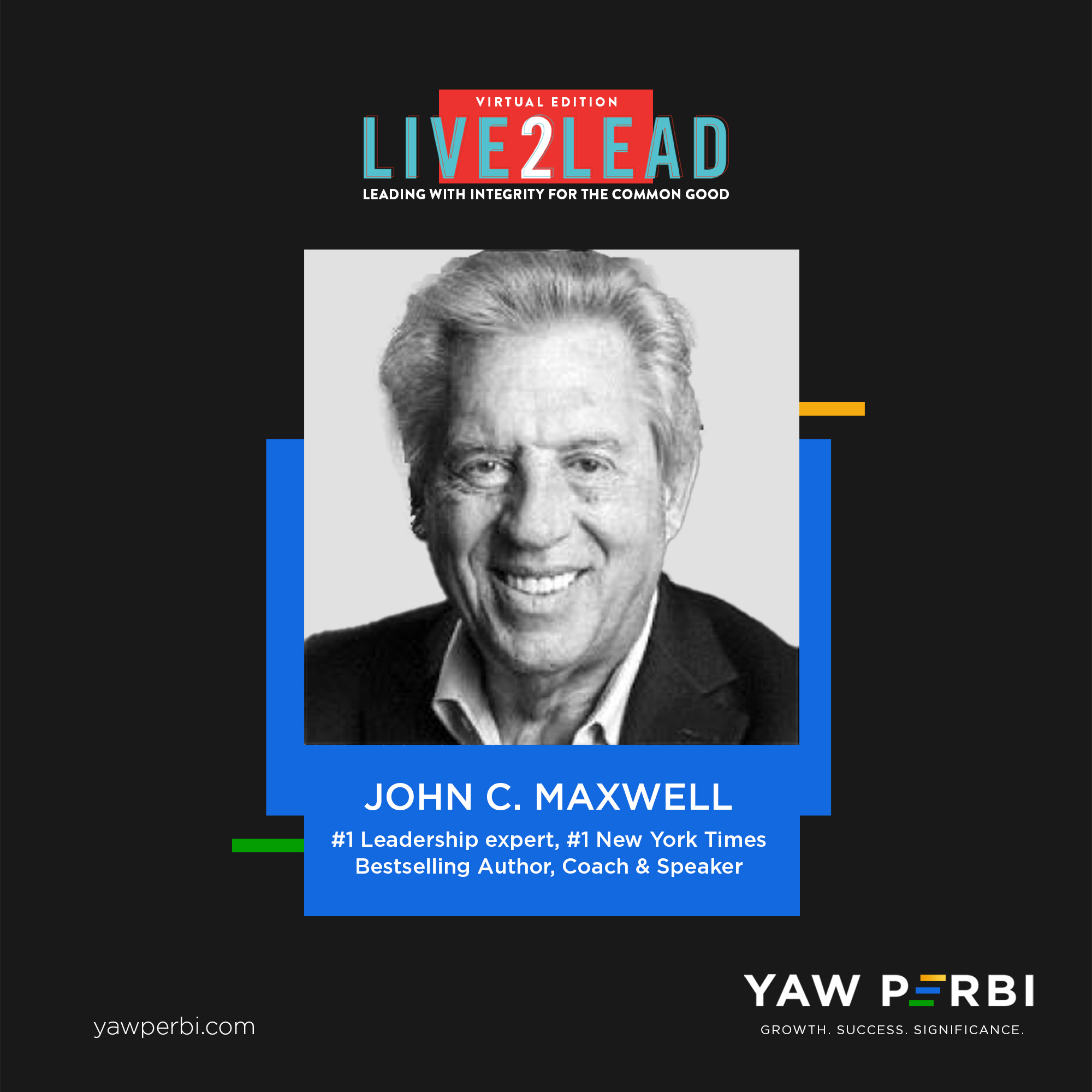
Meet John Maxwell, Mentor Emeritus
No single individual has influenced my leadership paradigm and praxis like Dr. John C. Maxwell. I started reading and understudying John in the late 1990s and have been teaching his materials ever since, both as a bonafide EQUIP trainer and a certified Maxwell coach/speaker/trainer on the John Maxwell Team (JMT).
Meet John Maxwell–my mentor emeritus–the #1 New York Times bestselling author, coach, and speaker who has sold more than 30 million books. John has been identified as the #1 leader in business by the American Management Association® and the world’s most influential leadership expert by Business Insider and Inc. magazines.
Dr. Maxwell has also received the Horatio Alger Award, as well as the Mother Teresa Prize for Global Peace and Leadership from the Luminary Leadership Network. His organizations—The John Maxwell Company, The John Maxwell Team, EQUIP, and the John Maxwell Leadership Foundation—have trained millions of leaders from every nation in the world.
The annual Live2Lead conference is John’s brainchild, and he always opens and closes, with other phenomenal faculty sandwiched in between. I have been privileged to host it on both sides of the Atlantic, in Montreal, Canada as well as Accra, Ghana.
LAWS OF COMMUNICATION AND LIMITS-BLOWING CONTENT
At Live2Lead this year, John C. Maxwell will be sharing new content from his upcoming book on the 16 Laws of Communication. Maxwell explains how to identify, grow, and apply your critical capacities. Once you’ve blow the “cap” of your capacities, you’ll find yourself more successful in your daily life.
We are absolutely convinced at YAW PERBI Executive Leadership Education that leadership (including communication) is taught; not just caught. Join John and the stellar faculty he’s put together for this year’s Live2Lead conference and up your leadership game. Register now through this link. Impress upon your organization to join the movement that will transform society by becoming a Patron of Live2Lead. A Patron company or individual is one that sends at least 10 leaders to Live2Lead. Together we can change our world for the better!
Register HERE, NOW.
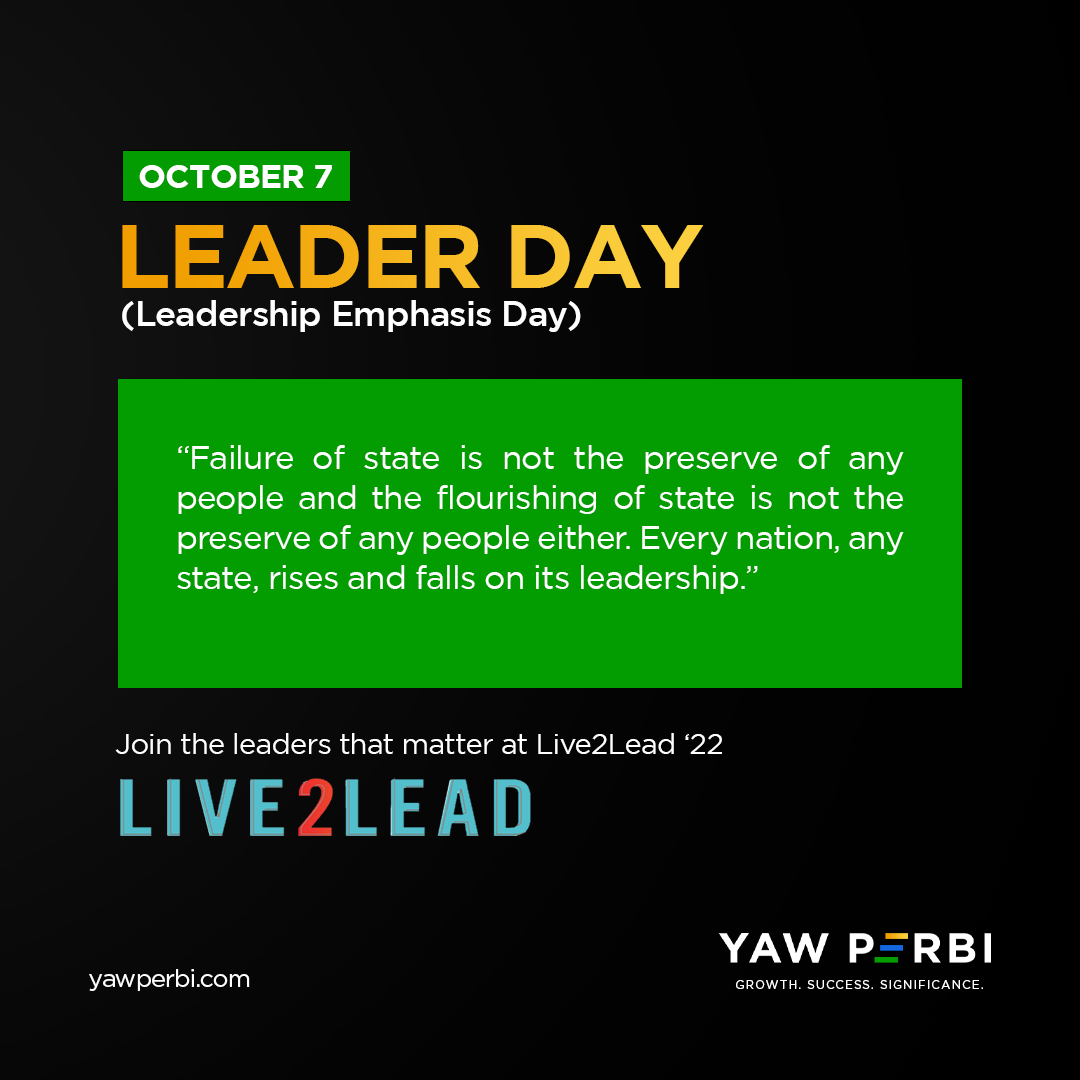
Of Principles, Principals & Principalities
This is a true story: A few years ago, a handful of us John Maxwell-certified coaches and trainers from Africa were trying our possible best to get John, the world-famous leadership expert, to visit a particular African country and engage their president. A good number of Maxwell-certified leaders have been travelling with John to specific developing countries to engage them in a bottom-up transformation process that have done these nations some real good and we hoped same for this African nation with great potential. But John doesn’t come cheap. In fact, one of us was serious enough about this that he cashed in part of his 401k (retirement savings in the U.S.) to make this trip possible. It was such a struggle to gain access to the president, like pulling teeth! Eventually we did. To my ‘shock and awe’ (just remembering U.S. President Bush Jnr.), this African president did not even know of John Maxwell! That is when I knew the country wouldn’t do well. And I was right.
LEADERSHIP IS THE TIDE
Over the last few years, especially with the Trump presidency and with the advent of social media proliferation, many of us have seen parts of the United States that we have never seen before. Horrible parts and horrific things—whether it is the wicked knee of a policeman on George Floyd’s neck or violent street protests or the infamous January 6 ‘insurrection’ or whatever it is. We had all this exposure to things we could not hitherto have imagined occurring in the ‘greatest nation in the world.’ At the peak of these happenings, during the Coronavirus pandemic, I frantically tried (see January 2021 article) to get some of my American friends to appreciate that Africans are no less human or merely more stupid than they are, and that if there is a difference between their economic status and my motherland’s it was just because, “everything rises and falls on leadership.” Leadership is the tide the raises all the other boats in a society (or otherwise). Most of them, I perceived, didn’t still quite get me.
AFRICA IS NOT THE PROBLEM
Just like we’ve seen in the last few years in America, we’ve also seen in several countries in Europe how “leadership is cause; everything else is effect.” I’ve lost count of how many Prime Ministers Britain has had in the last little while, and we all witnessed with horror the leadership (or the lack thereof) of the last one with the Russian first name. Africa is not the problem, leadership is. Failure of state is not the sole preserve of any nation neither is the flourishing of state the preserve of any nation. Every nation, any nation, rises and falls on its leadership.
“WE THREE KINGS”
These three kings are at work in nation building: Principles, Principals and Principalities. If you like, these actors are Laws, Leaders and Luciferites. Principles are neutral, Principals are supposed to be working for their people while Principalities are against. There are principles that touch on every aspect of life, including leadership. When these principles or laws–which are timeless, universal truths–are lived out, nations do well, families flourish, churches and organizations prosper. When they are broken we don’t.
It is easier to appreciate the physical and chemical principles because we can see and feel and touch them and their consequences. The Law of Gravity is the commonest example of a principle of Physics (physical law). There are leadership principles as well. Many of these are intangible in their operation but produce very tangible effects reflected in socioeconomic and other indices. Nations that live by principles, these consequential laws of the universe that make this world run properly, prosper and nations that do not live by principles don’t. The nations whose principals (leaders) live by these principles prosper; those that don’t do not suffer. It bears repeating that this applies to families, communities, churches, organizations… you name it.
WHERE DEMONS COME IN
Of course, those of us who believe in spiritual things know that over every nation and territory there are also what we call Principalities (Lucifer’s forces). These ‘Luciferites’ (I call them), are spirits that have territorial control that want to oppress nations and not let them come to their full manifestation. Why, you may ask? Out of envy of humans and out of spite for their Creator. But guess what? If you have principals (leaders) who live by principles (laws), including spiritual principles on how to deal with these powers, those nations, those families, communities, churches, organizations and countries of such leaders would bloom.
STOP THE BLAME GAME, NOW
Africans! let’s stop blaming how socioeconomically bereft we are on Principalities. It is our lack of following Principles—all of us—and particularly the lack of our principals leading in a principle-based manner as they should that has landed us where we are. We have an opportunity on October 7, all of us, to learn more of these principles as principals, whether we are executives in companies, pastors of churches, student leaders, public sector actors or whatever. We must all learn to lead better. When the leader gets better everything everyone else gets better.
It’s time to take on the principalities (Lucifer’s powers) that are oppressing and not making us prosper as nations and communities and it would come from the principals (leaders) who would live by the principles (laws) of leadership and lead the rest of us to do same. Don’t blame the principalities—and you can’t blame the principles either—it all lies on the principals. Principles are fundamental laws that cannot be changed and must be lived by to prosper. Principalities are spiritual powers that can be challenged to let things “be on earth as it is in heaven.” Neither principles nor principalities are respecter of persons, whether principal or peasant. Nations with great principals (leaders) abide by principles (laws) and defy spiritual principalities (Luciferites) to make their nations prosper. How laudable is your leadership?
Remember the nation whose principal-in-chief was clueless about leadership principles, at least as taught by Maxwell? I feel sorry for his people as I see and hear of their plight each day, worsened by the Coronavirus invasion of our planet. It’s not the devil; it’s our leaders. As one medical colleague pursuing Paediatric Pulmonology in South Africa poignantly commented on my PEP Talk on YouTube about this matter, “Once our Principals follow Principles and we the led are inspired, we will be too busy prospering to blame Principalities.” Enough said. Are our principals hearing?
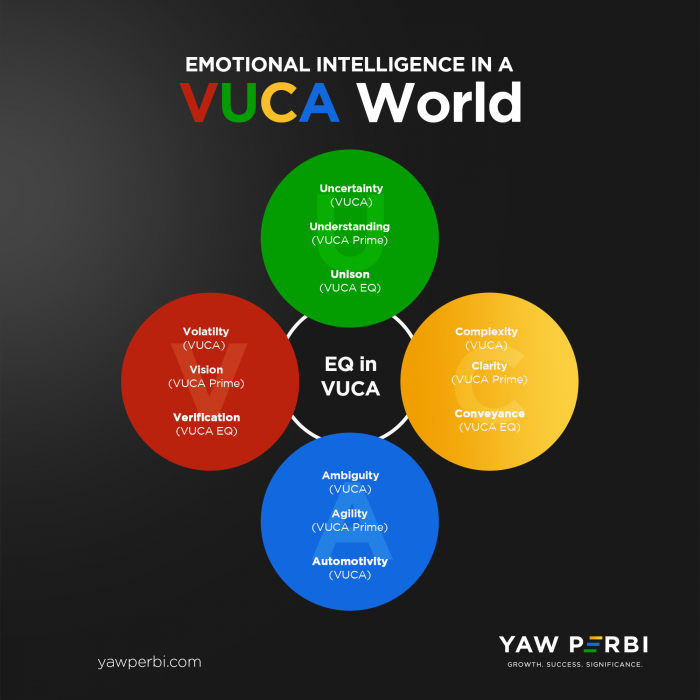
SO YOU THINK YOU CAN LEAD WITHOUT EQ IN A VUCA WORLD?
As one of the Pan African Cohort facilitators of BCA Leadership, I just got off a scintillating Zoom call with amazing African C-level leaders from across the continent—East Africa (like Kenya and Uganda), West Africa (I recall Nigeria, Sierra Leone and Ghana), North Africa (Egypt) and Southern Africa (Malawi, South Africa). We talked about Emotional Intelligence and the whole idea of VUCA. The goal of this blog is to summarize the essentials of the topic, which most participants described as ‘intriguing’: “So you think you can lead effectively without EQ in a VUCA world?” Really, this is a rhetorical question because no one in their right senses would say, “Yes, I can lead effectively without Emotional Intelligence (EQ)” in the first place, let alone in a world that’s described as VUCA.
WHAT ON EARTH IS VUCA?
VUCA is a term that came from the military space, especially at the end of the cold world war when without the two clear polarizing forces the whole world was described as Volatile, Uncertain, Complex, and Ambiguous. Guess what? If the end of the last century was said to be VUCA then imagine just how much more VUCA it is now. Look at the volatility of the world today, look at the speed of transformation, the dizzying digital economy. Consider the uncertainty with COVID-19 and this post-pandemic world. Is it even a post-pandemic or rather para-pandemic world as in some places it seems over and in others, COVID is still raging? Look at the complexity of the world. How could a microscopic virus emerge in a small place in some corner of the world called Wuhan, China, and the whole world gets grabbed into this? Some things are just ambiguous right now. It’s a VUCA world. There wouldn’t be enough space to write out all the feelings these VUCA times have generated in people, especially anxiety.
HOW ABOUT EQ?
Even before the VUCAness of the world, Emotional Intelligence had been identified as the key thing for succeeding in leadership. It is archaic 20th century thinking that IQ (intelligence quotient) makes a good leader for a total leader not only has IQ, in terms of book smarts or cognitive intelligence, but also Emotional Intelligence (EI/EQ) in terms of being intelligent about feelings and Global Intelligence (GQ). Humans like to think we are rational people but at the end of the day we are emotional beings. The term was first coined in 1990 by researchers John Mayer and Peter Salovey, but was later popularized by psychologist Daniel Goleman five years later.
We now know that 80-90% of success in Executive Leadership depends on Emotional Intelligence and not cognitive intelligence. Don’t get me wrong, I am not dumb. I am a medical doctor for crying out loud. Intelligence is important but guess what? When it comes to Executive Leadership, IQ only gets you into the door, it takes EQ to play the game. And win. After about 128, IQ doesn’t matter anymore! Given the same level of IQ, technical skills, and competence, it’s EQ that would make all the difference in how much one succeeds (or not).
Emotional intelligence, according to Psychology Today, is “the ability to identify and manage one’s own emotions, as well as the emotions of others.” It is thus made up of the following four blocks:
BUT THERE’S PROBLEM
So being the amazing leaders we are, we figured out we cannot just sit idly twiddling our thumbs and watch VUCA happen without responding. In 2007, one Robert Johansen (a distinguished fellow at the Institute for the Future), came up with a behavioral leadership model he called VUCA Prime to counteract each of the four elements of VUCA with a specific positive response which starts with the same four letters. VUCA Prime then is to have Vision over Volatility, to overcome Uncertainty let’s have Understanding, then Clarity over Complexity and to overcome Ambiguity let there be Agility.
Well, I have been studying this since the pandemic began and was thinking recently how good VUCA Prime is but how so very cognitive it is! Why is VUCA Prime so cognitive and does not take enough emotions into cognizance especially when we know 90% of success will depend on a leader’s emotional awareness (of self and others) and responses?
WHAT IS VUCA EQ THEN?
Consequently, I have designed something called VUCA EQ to provide a more comprehensive and potent leadership response to VUCA beyond the cognitive, one that significantly takes emotional intelligence into consideration. Like VUCA Prime, each of the VUCA EQ responses also begins with the same four letters.
Firstly, V is Verification: we need to be able to decipher what our emotions are and label them correctly. Then we need to be able to do the same for others as well so we can respond rather than just react, and we can manage our emotions and that of others instead of just trying to control them. The world of command and control is gone!
Secondly, instead of Uncertainty and just responding with the cognitive Understanding that VUCA Prime proposes, we rather respond in Unison. What I mean by Unison is to respond with our three brains. You have the cognitive brain but you also have your emotional brain called the limbic system. EQ is not just a ‘heart’ kind of thing, no! Emotional Intelligence has to do with the brain too. Or even more annoying, called ‘soft skills.’ EQ produces hard results on the balance sheet and cashflow statements! There is the Cognitive brain, Emotional brain, and Instinctive brain and VUCA EQ is about responding with all three in unison.
For Complexity, not only overcome with clarity but with Conveyance. Powerfully transmit emotional then logical information and carry across values and perspectives, considering emotional data and communicating emotions first. Remember to start with emotional data when decision-making and communicating eg. I feel vexxed about this decision and I’m aware most people in the company feel anxious…. Connect with emotions and convey them in response to complexity.
Then finally, for Ambiguity, not only thrive with agility but by Automotivity. In other words, learn to move people’s emotions or move people emotionally. Automotivity means containing within itself the means of propulsion or movement. Mobilize people in such consonance and resonance with what they want (motives) and how they want (motivations) that they move in a self-propelling manner. After all, why do you suppose feelings are called e-motions? Feelings move us, they move the world. We may not like to acknowledge it but they do. How do you learn to know people’s motives and their motivations so that you can ride on that to send them (better still, travel with them) to a place where they ought to go?
CONCLUSION
Leadership is in the transportation business. We move people from here to there and without the power of Emotional Intelligence to move people (think e-motions) towards a shared, noble purpose, we are going nowhere ourselves in the first place and taking no one with us for that matter. Don’t you ever think you can successfully lead, especially in this VUCA world, without Emotional Intelligence.
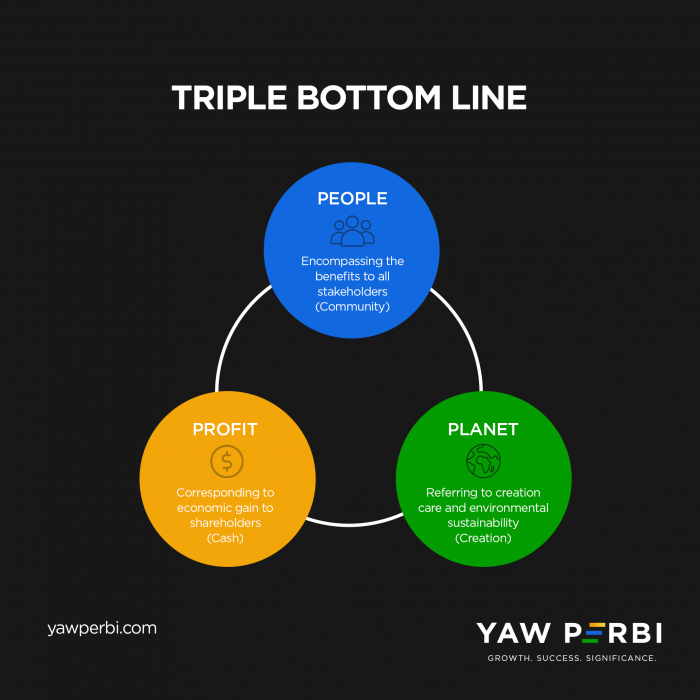
Are You Aligned with the Mission of God in the Marketplace?
Marketplace leaders of faith, it’s time to align. Since returning to Ghana, after several years mainly in Canada, that is a word I’ve heard a lot in my re-orientation: align. “Let’s align, let’s align,” I hear this quite often! CEOs want to align with their boards, other C-level executives need to align with their various teams, sales and marketing must be congruent, and everyone needs to align with the company’s vision, mission and values. All well and good.
Let’s elevate this alignment conversation as I dedicate this particular blog to marketplace leaders who are Christ-followers. The Christ-following marketplace leader does not, and indeed cannot, have the same motives and bottom line as someone who isn’t a Christ-follower. This week, I had the opportunity to speak to a group of emerging leaders on “Man with a Vision on a Mission,” which was essentially about the purpose of life. Dr. Myles Munroe of blessed memory once put it so poignantly, “The greatest tragedy in life is not death, but a life without a purpose.” Purpose is when you know and understand what you were born to be and accomplish, what something was made for. Or as they say in the French city of Montreal my family and I have been domiciled in for over a decade, raison d’être (reason for being). I’ve also held discussions with some of the C-level executives in the Ghana Club 100 from mining to fintech about purpose. (Ghana has christened the top 100 companies as the Ghana Club 100, akin to the Fortune 500 in the United States). These premium companies have profit, for sure, but how about purpose?
WHY WE ‘GO TO MARKET’
We are in business for profit, that’s the bottomline—or so we thought until a couple of decades ago, the concept of ‘Triple Bottom Line’ arose (thank you John Elkington) as a result of people pursuing profit at the expense of human well-being and the sustainability of our earth. The bottomline has since been triadized as Profit, People, and the Planet. That’s the triple bottomline. All three come together for holistic prosperity and complete sustainability.
Profit, is about acing financial performance, generating dollars for shareholders. By People we mean a focus on a business’s societal impact, or its commitment to human beings—within and without the company or organization. People are the other stakeholders beyond the shareholders (who are taken care of largely by profit). We mean people impacted by business decisions from customers and employees to community members. With all the talk about climate change and the like, companies are now tasked to also aim at making a positive impact on the Planet as they seek to capitalize on it to make profit.
Yet while all three are important to everyone in the market—of all faiths, little faith or no faith—I refer to the above treble as the temporal bottom line. There is a timeless triple bottom line, which is what I want to draw the attention of marketplace leaders of faith to.
MISSION IN THE MARKET
I’ve realized that we need a reorientation of why we’re in the marketplace, and what our mission is, as Christ-followers. I often tell people that if they don’t have a personal purpose statement, they wouldn’t know which company to work with or for because they won’t know if they are aligned. Your values must be compatible with theirs. Similarly, if you are a Christ-follower, your mission in the marketplace must be aligned with God’s mission.
What exactly is God’s mission? That’s the timeless triple bottom line I refer to. God is on a three-fold mission in the world:
1. Towards Himself—to bring glory to Himself. God gets glory when we reflect His good nature in our being and doing. He desires, and deserves, to receive glory also from the obedience, service and worship of all nations and peoples in every sphere of life, from Archaeology to Zoology. Are your life, leadership and work God-glorifying?
2. Towards creation—to bring a blessing to all created things. God is on a mission to bless all of creation, not just people. People, first and foremost, but all of creation is a candidate for God’s blessing. While the blessing would include the temporal financial profit, people’s prosperity and the planet’s care (triple bottom line), the greatest of blessing is all creation being freed from the penalty, power and presence of sin to be God’s friend once more, to worship and serve Him and reflect His nature lost once-upon-an-Eden again. So, the second-fold mission of God in blessing creation comes through in the 3BL of business, but there is a redemptive element that I dare to say is the most important. I say this because that will outlast how long profit, this planet and this life will endure. Are your life, leadership and work creation-blessing?
3. Against evil—to vanquish evil and establish His Kingdom on earth. Yes, your mission as part of God’s grand mission is to pillage evil to establish God’s righteous, just, and equitable Kingdom on earth forever and ever, as it is in heaven. Are your life, leadership and work evil-crushing and Kingdom-establishing?
PRAYER AT WORK
We see the above three-fold mission of God in the prayer Jesus taught his disciples:
1. Glory to Himself—“Our father in Heaven, Hallowed be your name… For yours is the kingdom, the power and the glory forever and ever, amen.”
2. Blessing to Creation—“Give us today our daily bread. And forgive us our debts (sins), as we also have forgiven our debtors.”
3. Against Evil—“Your kingdom come, your will be done on earth as it is in heaven… And lead us not into temptation, but deliver us from the evil one…”
Organizing prayer at work with like-minded, same-hearted folk of faith is good but being the answer to the prayer is even better—makes it complete.
BOTTOMLINE
Consider this! As a person, am I aligned with God’s mission? Is this what my life, leadership and work are all about: bringing God glory, blessing creation, defeating evil and establishing God’s kingdom? Is that what my company stands for?
So being an effective agent of God in the marketplace is going for the timeless triple bottom line for God’s glory, for blessing people and the planet in general, but especially the blessing of redemption, and ultimately defeating evil to establish God’s kingdom on earth as it is in heaven, starting with your workplace. This is the tried-and-true-and-timeless triple bottom line. Is your work and leadership redemptive?
We must all align ourselves with God’s mission because to be with God on his mission is the greatest cause of all time for all people on Earth in any and every era. Oh, that it would be done in our marketplaces as it is in heaven!
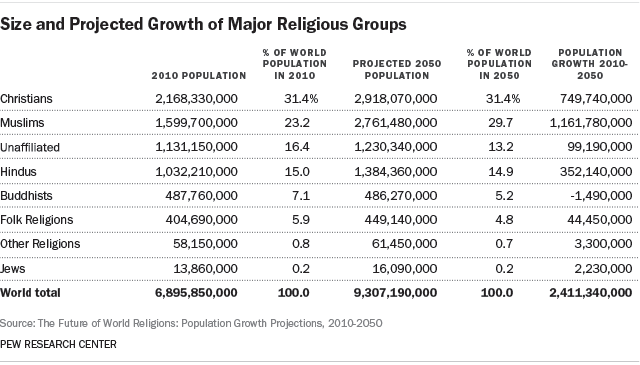
Relax. Religion isn’t going anywhere.

Although Pew’s projection of the Christian numbers is disputed by many, like the Center for the Study of Global Christianity (that it should be much higher)), the point being made in this article is still clear: the majority of the world has and will continue to be religious.
I’m very excited to begin my doctorate in global leadership this week. Having been a student of leadership for the last 25 years plus and acquired a Master’s degree in it a few years ago, I’ve felt it’s time to do the whole nine yards, not so much for the title (after all I’m already a doctor) but to go deeper and be even better-seasoned in my darling subject (or is it object?).
In going this doctorate route, I opted for a seminary environment because faith matters immensely to me, and indeed to the majority people in the world. The increased secularization of a formerly mainly ‘Christian’ Europe and certain sections of American society seems like an overwhelming flood to many only because it is a sharp deviation from the not-so-distant past when there was hardly any division between church and state; but also because the West disproportionately fills the media space. Only last week the German national broadcaster shared that a recent poll showed “most Germans find religion unimportant.” Yet the fact remains that the majority of the world has and practices a faith of sorts. In 2025, 90% of the world will be religious, my friends who run Operation World say; and by 2050, at least 87% of the world will still be religious, according to Pew Research.
The mid-twentieth-century secularization theory—that an increase in modernity means a decrease in religion— has been largely debunked by the likes of Berger (2014). According to Todd Johnson, who I just exchanged emails with, an astute associate professor of Global Christianity and Co-Director of the Center for the Study of Global Christianity at Gordon-Conwell Theological Seminary, “Despite increased modernity the world has in fact become more religious; 80.8% of the global population self-identified with a religion in 1970, rising to 88.1% in 2010 and with a projected increase to 91.5% by 2050,” higher than Pew’s projected 87% cited in the previous paragraph! Even the ‘unaffiliated’ doesn’t mean they aren’t religious; it often means they choose not to be identified with any ‘institutionalized’ religion. Just as humans have a physical, social and mental components that cannot be denied, so is there a spiritual capacity that we cannot run away from. French mathematician and philosopher Blaise Pascal put it succinctly, “There is a God-shaped vacuum in the heart of each man which cannot be satisfied by any created thing but only by God the Creator,” and in his experience and exposure, “by God the creator made know through Jesus Christ.”
By the way, I use the world ‘religion’ generally (and maybe even generously) because as an insider of the Christian faith I wouldn’t call Christianity a religion per se. Religion connotes man in search of God while in the Christian faith it is actually God in search of man. Not only that, religion tends to paint a picture of rigorous rules and rituals while true Christianity is more of a relationship with the Divine than a set of rituals or rules per se. That being said, for the purpose of this article faith, spirituality, divine relationship and religion are all being treated as ‘religion.’
FAITH AND WORK, FAITH @ WORK
Without God, and my faith in Him, I do not have a reason for being, a raison d’être. Neither do I have sustainable passion for my doings because all of it feels like, in the words of the wisest and wealthiest monarch ever, “vanity of vanity, it’s all vanity.” I have observed with grave concern the increasing divorce of faith from the work space, treating it like the plague or some highly contagious disease. Even on work-centric social media like LinkedIn, one cannot help but get the feeling that the mention of God in posts ‘spoils the atmosphere,’ which is riddled with human achievements, of brain and brawn (mainly the former), simply singing of how great we are.
But statistically, 90% and over of the people on LinkedIn are religious. There are myriads like me who know we wouldn’t be as excellent professionally but for our faith. Meanwhile, all who have an active religious affiliation yet act at work as if they have no faith are walking on the dangerous ground of inauthenticity. It is not integrous to want to, or have to, hide such an important part of one’s life as spirituality or faith in a space that easily takes up a third to half of our waking hours: work!
This week, a Muslim mate of mine from medical school, now a neurosurgeon, posted on our year group’s WhatsApp platform a screenshot of a heartfelt social media post someone had made about Dr. Aba Folson, one of our Christian colleagues who is now a cardiologist. This person who made the post, a nurse, starts by saying, “I have been blessed in my journey in the Nursing/Healthcare space to be working with amazing, highly religious health workers. One of such awesome ladies is Dr Aba Folson. She is a Cardiologist.”
She goes on to describe “her humility, assertiveness, excellence and brilliance” and how Aba has “broken protocols to help save my very critically ill patients.” The protocols she speaks of, I believe, were put in place to save patients in the first place, but there are situations where one has to do the unusual and even unconventional at great risk, which separates humans from machines and even artificial intelligence. The wisdom and courage to make such calls, Dr. Folson will say, I know for sure, comes from above. The writer of the text seems to be enamoured by the fact that Aba is “an astute Christian and sings in the choir.”
ALL WE NEED IS RESPECT
I still remember zooming down the corridor between the ER and the blood bank to fetch blood for a critically ill child. This was during my days as a medical officer at the 37 Military Hospital in Accra. We usually had junior staff who would do that but no, this young doctor run in his white coat. The child’s mother gathered the energy to attempt to run alongside me. Barely catching up and hardly catching her breath she managed to say these words, which I shall never forget, “Doctor, doctor I can tell you are a Christian.” She must’ve known that for a Christ-follower the Pauline admonition about work is clear and strong: “Whatever you do, work at it with all your heart, as working for the Lord, not for human masters.”
What is needed, indeed all that is needed, is for respectful co-existence in a pluralistic workplace, which is a microcosm of a really pluralistic world. The fight for diversity and inclusion in the workplace must not, and indeed cannot, be limited to ethnicity, age, gender, (dis)ability and such alone but faith as well. The majority of us wouldn’t be present at work with purpose and perform with passion and excellence without it, and none of us will be authentic in the workplace pretending we didn’t have it.
Faith works. Let your religion work at work—faith, love and hope at work. Your faith should make you a better professional; not worse. If your faith doesn’t make you better at work—which is all about service to humankind made in the image and likeness of God—it’s not worth following. Change it. Let’s see faith at work working, doing good works that bring God glory and bring about the good society—that’s the way it ought to be.
Post Script.
Right after I posted this blog, I came across a photo and headline on LinkedIn that said, “South African doctor: Professor “Mashudu Tshifularo” just became the first surgeon on earth to successfully perform surgery [with 3D technology] to cure deafness. He is also a pastor.” Ahem. Point nailed!
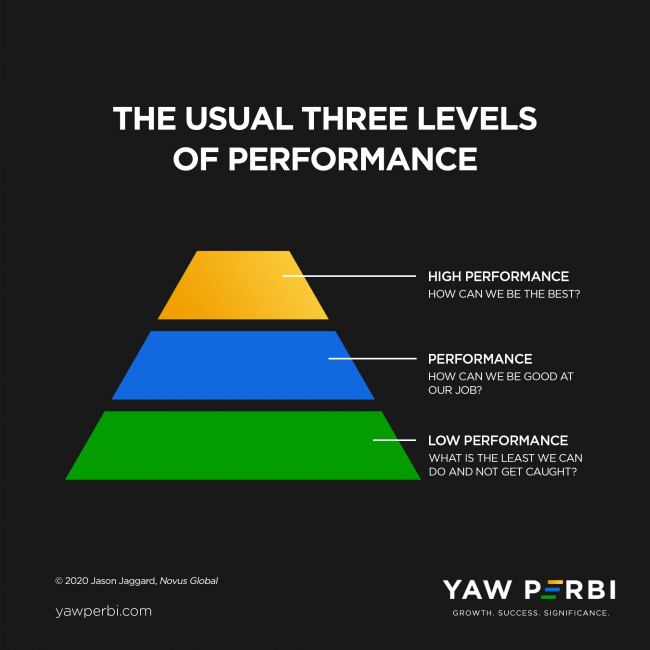
“Can You Go Beyond High Performance?”
“Can you go beyond high performance?” That’s a penetrating question Jason Jaggard, founder and CEO of the executive coaching firm Novus Global, asks in his powerful and popular article that bears that title. My good friend and StrengthsFinder coach, Dan Leffelaar, who is COO and partner at Novus Global, had exposed me to the company after he joined. Later he would introduce me to one of their very competent coaches, Joseph Thompson. It was Joseph who then drew my attention to this article even before we would have our first formal coaching session. By the way, I’ve said it before and it’s worth repeating, never hire a coach who doesn’t have a coach!
DIFFERENTIATION–OR WHATEVER YOU CALL IT
It is not uncommon for managers to categorize workers in the marketplace into three: low performers, performers and high performers. Over a decade ago, I remember reading about this idea from long time General Electric CEO Jack Welch’s book Winning. He called it differentiation, separating the sheep from the goats. According to Jack, differentiation is a process that requires managers to assess their employees and separate them into three categories in terms of top performance: top 20 percent, middle 70, and bottom 10. Then—and this is key—it requires managers to act on that distinction.
Whatever different percentages one uses to divide the three levels (and some just use the Pareto principle to divide the top 20% from the remaining 80%), the questions the people in each band ask themselves that result in their kind of performance are intriguing:
- Low Performers–“What is the least we can do to get by–and not get caught?”
- Performers–“How can we be good at our job?”
- High Performers–“How can we be the best?”
Often the morale of the story is “be the best,” be a high performer. Or, in the precious words of my dad’s alma mater (in Latin), Vel primus vel cum primis. To wit: either the first or with the first. But that is precisely the problem. High performers typically stop growing because they feel (or are made to feel) they are the best, or among the best, and have hit their peak when that is far from the truth! That’s the challenge of comparing ourselves to others instead of to our own potential. Don’t forget the saying that “in the land of the blind, the one-eyed man is king.” What is high performance about one eye just because everyone else you’re compared with is blind?
In fact, not only does Jason point out two common mistakes of high performers here but Novus Global as a practice firmly believes “attracting and retaining high-performers is a mistake and doing so creates a predictable set of problems.” You probably have met a lot of high performers who are still unhappy. Barring greed and envy, could Abraham Maslow’s observation be the cause? “If you plan on being anything less than you are capable of being, you will probably be unhappy all the days of your life.”
META-PERFORMANCE
So “can one go beyond high performance?” remains the question. “What comes after high performance?” I’m glad you asked. “If your team doesn’t have a clear and compelling answer to the question “What comes after high performance?” then you absolutely have an unnecessary cap on the possibilities of your leadership and the impact of your organization,” says Jason. The answer lies in a word he’s coined: meta-performance. And this is “meta” is not like “meta-data” but “meta” as in “metamorphosis,” like a caterpillar transforming into a butterfly. A meta-performer isn’t committed to being the best (“how dull,” Jason says)… a meta-performer is committed to constantly exploring capabilities.
Unlike “What is the least we can do to get by–and not get caught?” (Low Performers), “How can we be good at our job?” (Performers) or “How can we be the best?” (High Performers), Meta-Performers ask themselves, “What are we capable of?” That is a potent question in and of itself, but to process that with a competent and caring coach is even more powerful!
I often say to people, I may not have been the best of medical students (I was a low performer) but I was a very good doctor (high performer). But as good a doctor as I was, the question of what I was capable of sent me on a totally different trajectory from my peers, from authoring books and motivational speaking through military experience and peacekeeping with the United Nations, to pastoring, restarting life as a Canadian immigrant and becoming CEO of a number of non-medicine related ventures, some with a budget of a few million dollars.
Meta-performance is akin to what my mentor John C. Maxwell calls The Law of the Rubber Band: Growth Stops When You Lose the Tension Between Where You are and Where You Could Be. The meta-performance life happens somewhere between feeling ‘just right,’ taut enough to be best at tying things up, to tearing up because we fail to embrace our God-given limits. Often times, we are poor judgers of thse book ends, and having a discerning coach to assist on this journey is vital.
“IMPOSSIBLE” ACCORDING TO WHO?
In what area(s) of your life have you lost your stretch and settled? Create some specific means for stretching in these areas of your life. Go back to your 2021 goals and ensure they’re not only S.M.A.R.T. but that they also STRETCH. Remember, “Only a mediocre person is always at his best,” saysW. Somerset Maugham, putting things in a way that hits home, hard. “Ouch,” says the best performers.
Walt Disney used to say, “It’s kind of fun to do the impossible.” I know the feeling, a little bit. Nelson Mandela was right: “It always seems impossible until it’s done.” I find it not only a powerful meta-performance question to ask “What am I capable of?” but also in line with that to inquire, “What sort of person must I become to be capable of that?” Then with Almighty God’s help, “just do it,” do the “impossible.”

